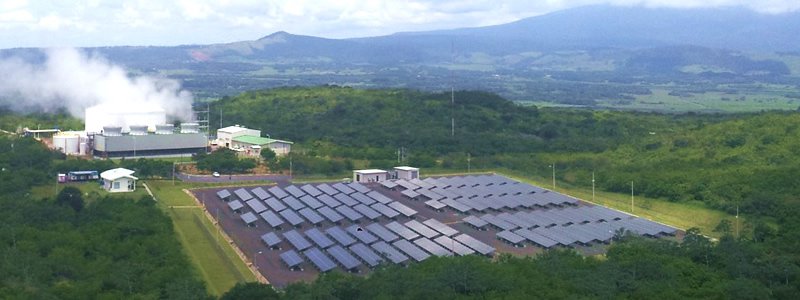
With more than 25% of its land designated as protected areas (whether as national parks or natural reserves) and an electric grid mostly relying on hydro power combined with geothermal and wind energy, Costa Rica is one of the most well-known examples of successful nature conservation and efficient renewable energy use in the world.
Over the last 20 years Costa Rica has been leading the way in integrating renewable energy sources into its grid, kicking off with small and big hydro plants and adding geothermal and wind production in more recent times. Many of the neighboring countries have followed Costa Rica’s golden example, leading the region to experience a major renewable energy boom.
Some might then wonder: what role did solar energy play in the country and what is to be expected for the future?
Solar energy has had an intermittent penetration in the country’s energy mix. Solar thermal has become slightly popular in residential use and a few industrial companies integrated it in their production processes as well. Photovoltaic solar energy, on the other hand, has faced some challenges in order to make it through to the Costa Rican electricity grid. It has been a bumpy road but things look better now for solar.
It all started with the “Plan Piloto de Generación Distribuida” (PPGD), a beta project from Costa Rica’s electric company Instituto Costarricense de Electricidad (ICE). The project enabled the end-users to produce their own energy from renewable sources for self-consumption. At the beginning of the PPGD, the public response wasn’t as good as expected, and it took around 2 years for households to become more engaged, thanks to a major drop of international PV prices, which made the technology more competitive As participation in the Plan increased, there were concerns about the regulation process, and the Authority for Public Services (Autoridad Reguladora de Servicios Públicos, ARESEP) intervened by releasing the norm “POASEN”, which in Chapter 12 established the ground rules for Distributed Generation for self-consumption (GD).
Some issues with POASEN arose later, the main one being that the Energy and Environment Ministry (Ministerio de Ambiente y Energía , MINAE) disagreed with ARESEP about the definition of “public service concession”. Called in for clarifying the situation, the Attorney General (Procuraduría General de la República, PGR) declared that energy generation for self-consumption is not considered a public service, but equals to selling energy.
Due to PGR’s statement, the Energy Minister became then responsible for establishing the game rules. A regulation was published early in October 2015, stating that ARESEP has to define the “access and interconnection fees”, their amounts and the ways to apply them. This is probably the final operational decision to be taken, and it is a matter of vital importance for grid-connected PV. These fees will define whether PV projects make financial sense, being it advisable that the ROI is reached within 10 years.
Utility scale projects are regulated by a more complicated law, the Ley 7200. Recently there was a bidding process for a 5 MW PV plant, which will have a PPA for 20 years. This will be the biggest PV project in the country and probably the only “utility scale” plant in the near future.
Costa Rica might be the green giant that the world loves, but in the field of solar energy it has yet to show it.
-
To find out more about investment and project development opportunities in Costa Rica and in the other Central American solar markets, join the conference El Futuro Solar Centroamérica and Colombia (19-20 November 2015, Panama City) today .
-
Acesolar is a private non-profit association that aims to bring together academia, industry and international cooperation agencies in order to promote the use and development of solar energy in Costa Rica. More info: www.acesolar.org
